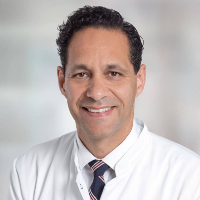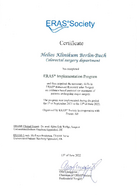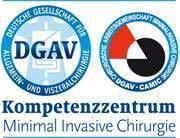Liver Cancer — Unilateral Hepatectomy: treatment in the Best Hospitals of Germany
Treatment prices are regulated by national law of the corresponding countries, but can also include additional hospital coefficients. In order to receive the individual cost calculation, please send us the request and medical records.

Department of General, Abdominal Surgery and Surgical Oncology
The Department of General, Abdominal Surgery and Surgical Oncology offers the full range of services in these medical fields. Whenever possible, operations are performed using minimally invasive techniques, which are the gold standard of modern surgery. The outstanding quality of medical care is confirmed by numerous prestigious certificates, including certificates from the German Cancer Society, the German Hernia Society, etc. In addition, the department provides innovative hyperthermic intraperitoneal chemotherapy (HIPEC), which is available only in the most progressive clinics in Europe.







Department of General and Abdominal Surgery, Colorectal Surgery, Hepatopancreatobiliary Surgery, Hernia Surgery and Bariatric Surgery
The Department of General and Abdominal Surgery, Colorectal Surgery, Hepatopancreatobiliary Surgery, Hernia Surgery and Bariatric Surgery provides the full range of surgical treatment in its field of competence. The department's highly qualified surgeons annually perform about 2,000 surgical interventions. Extensive clinical experience allows the specialists to perform even particularly complex operations. The department’s advanced operating rooms serve for surgery to treat gastrointestinal diseases, liver, gallbladder, bile duct, pancreatic, rectal, anal and colon pathologies. The medical facility also successfully performs operations to treat hernias: inguinal, umbilical, and anterior abdominal wall hernias. In addition, the department's doctors deal with the surgical treatment of morbid obesity. Minor traumatic laparoscopic interventions are considered the gold standard, which guarantee a patient minimal risks and rapid postoperative restoration. Surgeons tell the patient in detail about their upcoming treatment and, in every possible way, support them in their recovery.







Department of General and Abdominal Surgery, Colorectal Surgery, Endocrine Surgery and Hernia Surgery
The Department of General and Abdominal Surgery, Colorectal Surgery, Endocrine Surgery and Hernia Surgery offers the full range of modern surgical interventions in the areas of its specialization. Every year, the medical facility performs more than 2,500 surgical interventions on an inpatient and outpatient basis. The department has vast clinical experience in the field of minimally invasive surgery, which allows the patient to avoid severe pain and prolonged hospitalization. In addition, the department offers robotic surgery using the most modern models of the da Vinci surgical system. The medical facility has the status of the Reference Center for Minimally Invasive Surgery and Hernia Surgery. Surgical treatment of cancer is one of the department's clinical priority focuses. A large number of da Vinci robot-assisted interventions are performed here for gastrointestinal cancers. The department holds a leading position in the use of the da Vinci surgical system in the treatment of rectal and sigmoid cancer patients. The operating rooms of the medical facility are equipped with the very latest technology, while hygiene and safety standards are at the highest level as well. Prior to surgery, the patient undergoes a comprehensive examination. Doctors also assess the risks of the upcoming operation and its expected results. With appropriate clinical indications, preference is always given to minimally invasive surgery.






Liver cancer is one of the most common and aggressive oncological diseases and usually develops due to viral hepatitis and cirrhosis. Surgery is considered to be the best treatment option, providing the highest survival rates. You can travel to Germany to undergo a safe surgical procedure with good results. The specialists at the Booking Health company will help you choose the most suitable clinic and organize your trip.
Content
- What is a right/left hepatectomy?
- How is the operation performed?
- Minimally invasive operations
- Where can I get treatment?
What is a right/left hepatectomy?
The liver consists of two lobes: the right lobe and the left lobe. Surgery to remove one of them is called a liver lobectomy (lobe removal) or hemihepatectomy, which can be right-sided or left-sided.
During a simple hemihepatectomy, doctors remove one lobe of the liver and leave the other lobe.. Subsequently, it overgrows, so the volume of functioning tissue increases. A healthy liver has a high ability to regenerate, although this may be reduced due to cirrhosis.
A partial hepatectomy for treating liver cancer is a complex operation. For this reason, it is recommended to have it performed at a specialized German clinic. The best hospitals in Germany ensure excellent success rates with a low risk of complications.
Hemihepatectomy is an effective surgical procedure that ensures the long-term survival of patients, even with large and multiple tumors. After the operation, there is a long-term remission of the disease for many years, and there is also a chance to be cured of cancer. The five-year survival rate after liver tumor surgery is as high as 70%.
How is the operation performed?
A unilateral hepatectomy in Germany is performed under general anesthesia. The doctor makes an incision under the ribs, applies clamps to the large blood vessels, crosses the liver parenchyma, and stops the bleeding using clamps, bipolar coagulation, or fibrin glue. The closure of the crossed bile ducts, which continue to secrete bile, is also required.
Although the liver is one of the organs that bleed a lot when incisions are made, adequate coagulation avoids significant blood loss. During hepatectomy surgery in Germany, the average blood loss is 200-300 ml, and only 3-4% of patients require blood transfusions.
Hepatectomy can be not only simple but also extended. This is an even more complex operation, as it involves the complete or partial removal of other tissues and organs, lymph nodes, and large blood vessels. Some patients will require vascular prosthetic repair. Such operations are performed in cases of portal vein thrombosis, tumors growth into large blood vessels, lymph node involvement, and tumor spread to adjacent tissues and organs. Even in these severe cases, surgical liver cancer treatment in Germany can still be successful, although survival rates for patients with advanced tumors are lower.
Minimally invasive operations
While segmentectomy (removal of one of the eight liver segments) and atypical resections are often performed using minimally invasive surgical techniques, such operations are uncommon for hemihepatectomy. They are technically challenging, but possible. The best German specialists perform both right-sided (more often) and left-sided (less often) laparoscopic hemihepatectomy. This operation involves several small incisions and one longer incision to extract the removed tissue from the abdominal cavity.
Oncological outcomes and survival rates of patients after laparoscopic hemihepatectomy are the same as after open surgery, but only if laparoscopy is performed by experienced surgeons and at a specialized center. The advantages of laparoscopy are less blood loss (100 ml on average), no need for blood transfusion, faster rehabilitation, shorter hospital stays, and less postoperative discomfort.
Where can I get treatment?
You can have a hemihepatectomy in Germany. You will be treated by proficient doctors from the top hospitals in this country. The advantages of treatment in Germany are as follows:
- Extensive experience with hemihepatectomy
- Successful performance of even complex surgeries for large, multiple, and widespread tumors
- High patient survival rates
- Low risk of complications
- High-quality postoperative care
- Possibility to perform laparoscopic hemihepatectomy at specialized centers
Get the best of the Booking Health service to find out the average cost of treatment in Germany, choose the most suitable clinic, and make your treatment appointment for your preferred dates. On our website, you can find current prices, compare the cost of services in different hospitals, and choose a suitable option. The Booking Health specialists will advise you on all questions, help you choose a medical center for liver cancer treatment, and take care of your travel arrangements. When you make your treatment appointment through Booking Health, the prices will be lower compared to directly contacting the clinic due to the absence of additional fees for foreign patients.
Authors:
The article was edited by medical experts, board certified doctors Dr. Nadezhda Ivanisova and Dr. Vadim Zhiliuk. For the treatment of the conditions referred to in the article, you must consult a doctor; the information in the article is not intended for self-medication!
Our editorial policy, which details our commitment to accuracy and transparency, is available here. Click this link to review our policies.
Sources:

